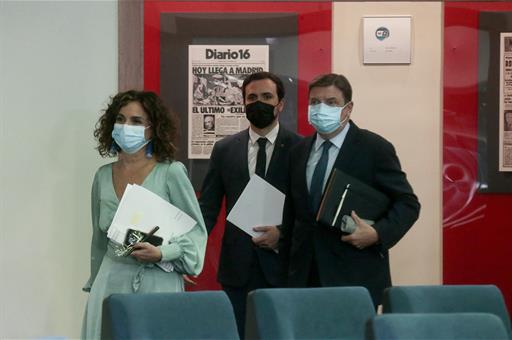Council of Ministers
Government approves extension to state of emergency until 9 May
Council of Ministers - 2020.11.3
Moncloa Palace, Madrid
The Council of Ministers approved the extension to the state of emergency requested from Parliament, in the terms backed by a majority of the Lower House on Thursday.
The Government Spokesperson and Minister for the Treasury, María Jesús Montero, specified that a six-month extension will be applied from 9 November to 9 May. The decision will be revised in four months with the aim of evaluating if its suitability remains valid or to propose lifting it.
María Jesús Montero reported that the proposal will need to be made to the government by the Conference of Regional Presidents, following a favourable agreement from the Inter-territorial Health Council. "The evolution of the health, epidemiological and social indicators will determine whether this state of emergency is lifted or remains in place, as is provided for in the regulation, as a maximum, until 9 May 2021".
During this period, each regional president will be able to alter, modify or suspend the measures that limit the free movement of people according to the indicators in their region, following notification to the Ministry of Health.
The Government Spokesperson stated that the government understands that "this Decree is the legal tool that provides each competent authority with full constitutional backing to act fully within the scope of the law"
The President of the Government will ask to appear before the plenary session of the Lower House every two months to report on the data on the pandemic and the government's handling of the application of the state of emergency. He will also answer any questions raised on this matter at the government control sessions.
María Jesús Montero stressed the suitability of the delegate authorities also accounting for their actions at their regional assemblies so that their decisions may be revised and discussed.
Government regulates advertising of gaming and games of chance
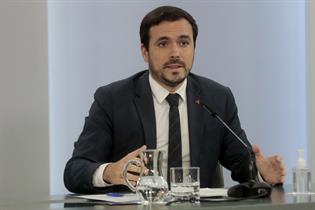 Foto: Pool Moncloa/JM CuadradoThe government has approved a Royal Decree on commercial communications on gaming activities that regulates, for the first time, the sector advertising of online gaming and games of chance in Spain.
Foto: Pool Moncloa/JM CuadradoThe government has approved a Royal Decree on commercial communications on gaming activities that regulates, for the first time, the sector advertising of online gaming and games of chance in Spain.
The Minister for Consumer Affairs, Alberto Garzón, argued that by taking this decision, the government responds to the growing social demand calling for greater public health protection for the most vulnerable groups, such as minors and young people, and for consumers as a whole.
Noteworthy measures
Alberto Garzón specified that gaming advertisements will be banned on the radio and television, except for during the period between 1 and 5 o'clock in the morning. And even at this time, the messages published will be hugely restricted and may not encourage the compulsive use of gaming. Adverts of this nature will also be banned on the Internet, social media and in the online press.
Famous people, whether real or fictitious, of public renown or fame may not participate in advertising on gaming activities, given that they exercise a tremendous influence, particularly on young people.
Alberto Garzón added that sports clubs may not feature advertising for games of chance on their team clothing. Nor may gaming houses sponsor sporting events, installations or activities.
Similarly, gaming operators may not use promotional offers to attract new players. Companies may only use promotional offers for registered and verified customers and in no event for people that have shown pathological conduct in gaming activities.
End of contracts in force
The new legislation will come into force following its publication in the Official State Gazette. Thenceforth, new contracts that breach these provisions may not be entered into.
The Minister for Consumer Affairs explained that the contracts in force will enjoy a moratorium of one sports seasons, that is, until August 2021. "Once extinguished, they may not be renewed and hence, as from that date, no type of advertising of these activities may exist".
The minister considers that this term is reasonable because it will allow gaming operators and related companies enough time to adapt their commercial relations and financing to guarantee the economic viability of their businesses.
Any breach of this new legislation will incur fines of between 10,000 and 1 million euros and the suspension of the business activity.
Completion of reform of Food Chain Act
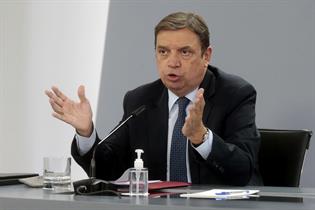 Foto: Pool Moncloa/JM CuadradoThe Council of Ministers approved the draft law to amend the Food Chain Act 2/2013 which, in turn, transposes European Directive 2019/633 on unfair trade practices.
Foto: Pool Moncloa/JM CuadradoThe Council of Ministers approved the draft law to amend the Food Chain Act 2/2013 which, in turn, transposes European Directive 2019/633 on unfair trade practices.
The Minister for Agriculture, Fisheries and Food, Luis Planas, explained that this reform completes the measures already adopted on the food chain in Royal Decree-Law 5/2020, of 25 February, which introduced specific aspects such as a prohibition on prices being lower than production costs and the implementation of advertising campaigns that undermine the value of products.
New features of legislation in force
The main aims of the new legislation are to give greater transparency to the functioning of the food chain and price formation, achieve a balance between the functioning of all levels of the food chain and protect crop and livestock farmers - "the weakest link in the chain" - remarked the minister.
The transposition of the European Directive will allow Spanish producers and exporters to be protected in their transactions with any purchaser in markets in EU countries. Furthermore, the material scope of the law will be extended to all food products subject to transformation - "bread, chocolate and beer, for example", said Luis Planas, and not just to crop and livestock products. And the black list of unfair trade practices banned under EU legislation has been extended.
As regards written contracts, the inclusion of new data will be regulated to foster their transparency and it will become compulsory to declare when prices are above the minimum legal limit. This now stands at 2,500 euros, said the minister, but by the time the passage of the Draft Law on Measures to Prevent and Fight Tax Fraud is concluded, it is planned to drop this to 1,000 euros.
The Food Information and Control Agency (Spanish acronym: AICA), attached to the Ministry of Agriculture, Fisheries and Food, will be the national reference authority on breaches and sanctions. Its control work will be enhanced through a budgetary increase, with a planned provision of 8.26 million euros, up 32%, contained in the Draft National Budget for 2021.
Luis Planas expressed his confidence in this draft law concluding its passage through Parliament in the first quarter of next year.
Positive situation of sector
The minister highlighted the "excellent work" of the primary sector, the agri-food industry and the distribution sector during the COVID-19 pandemic, which has meant that "sufficient quantities and quality of food and drink has been available and that they have been able to continue exporting and boosting our foreign markets".
The economic performance of the sector has also been positive. In fact, highlighted the minister, it is the only sector which has seen its GDP rise in the last 12 months, up 6.9% according to the National Statistics Institute. Exports to the European Union and third markets have risen by 5.5% in the last year and Spain is the second-ranked country in the European Union, after the Netherlands, with a positive net balance of 25%.
Despite these buoyant figures, Luis Planas reiterated the government's support for the demands for structural reforms made by "crop and livestock farmers, the food sector and the whole rural environment for its transformation".
In addition to the reform of the food chain, Luis Planas referred, by way of this commitment, to the provisions planned in the upcoming National Budget and the Recovery, Transformation and Resilience Plan to strengthen the agricultural insurance system and the support for the renewal of the fleet of agricultural machinery. At a European level, he mentioned the agreements reached on the new Common Agricultural Policy and the funding for Spain, which amounts to 47.72 billion euros.
Protection of culture sector
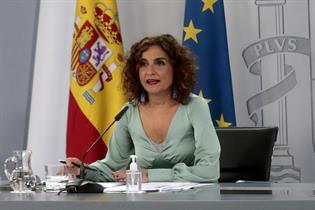 Foto: Pool Moncloa/JM CuadradoThe Council of Ministers approved new measures that foster unemployment protection for workers in the culture sector and complement the support measures for this group, which has been particularly affected by the suspension of their activity as a result of the COVID-19 pandemic.
Foto: Pool Moncloa/JM CuadradoThe Council of Ministers approved new measures that foster unemployment protection for workers in the culture sector and complement the support measures for this group, which has been particularly affected by the suspension of their activity as a result of the COVID-19 pandemic.
María Jesús Montero announced that given the persistence of the restrictions stemming from the health crisis, the extraordinary unemployment benefit for artists in public shows will be extended until 31 January 2021. In addition, a three-month exceptional unemployment subsidy will be created for technical and auxiliary staff in the culture sector.
The text also provides for extraordinary access to unemployment benefits for workers in the bullfighting sector. They will receive a maximum of 775 euros until 31 January 2021.
The minister stated that these workers have been affected by the suspension of their activity precisely at its busiest period, which has prevented them from contributing the necessary amounts to entitle them to unemployment benefits.
475 million euros of temporary public support for AIR EUROPA
The government agreed to authorise the first operation under the Fund to Support the Solvency of Strategic Companies to support the airline Air Europa. Specifically, it has been granted support amounting to 475 million euros - 240 million through an equity loan and 235 million through an ordinary loan that may be returned in a period of six years.
This fund, set up through an agreement of the Council of Ministers on 3 July with a provision of 10 billion euros, seeks to offer temporary public support to enhance the solvency of non-financial companies affected by the COVID-19 pandemic that are considered to be strategic for the national or regional productive fabric.
The Government Spokesperson remarked that the companies Air Europa Holding, S.L.U, Air Europa Líneas Aéreas, S.A.U and Aeronova, S.L.U. comply with the two main requirements for access to the fund. Firstly, because the pandemic has reduced their activity by 95% in terms of flight numbers in the period April-June, and secondly, because they comply with the strategic nature regulated by providing "an essential service to ensure Spain's connectivity and contribute to guaranteeing an adequate offer of tourist destinations, thus benefitting users as a whole".
María Jesús Montero recalled that Air Europa is the second largest Spanish airline in number of flights to international destinations, particularly in Ibero-America, and is a significant operator at Adolfo Suárez Madrid-Barajas Airport and for connectivity with the Canary and Balearic Islands and with the rest of Spain. In terms of revenue, it accounts for 18% of the total figure for all Spanish airlines.
Renewable energies and decarbonisation
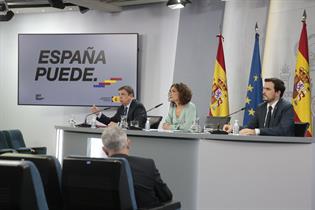 Foto: Pool Moncloa/JM CuadradoThe government has established a new framework for future renewable energy facilities though auctions. Participants that are prepared to charge for the energy generated at their facilities may bid, explained the Government Spokesperson.
Foto: Pool Moncloa/JM CuadradoThe government has established a new framework for future renewable energy facilities though auctions. Participants that are prepared to charge for the energy generated at their facilities may bid, explained the Government Spokesperson.
This new legislation develops Royal Decree-Law 23/2020, on measures on energy matters to enhance the economic reactivation, approved on 23 June, and responds to the need to offer a stable framework that attracts investment and promotes economic activity throughout the value chain of the country's renewable energies, while allowing consumers to directly benefit from cost reductions in the generation of these technologies.
Towards climate neutrality
The government approved the Long-term Strategy for a Modern, Competitive and Climate Neutral Spanish Economy by 2050 (Spanish acronym: ELP 2050), which marks the path towards decarbonisation to achieve climate neutrality by 2050.
The aim is for Spain to reduce greenhouse gas emissions by 90% on 1990-levels, and absorb the other 10% through so-called carbon sinks. "The positive impact on air quality will be beneficial for the quality of life of our people and for conserving biodiversity", said María Jesús Montero.
The document also identifies economic and job creation opportunities raised in the decarbonisation process as keys to job creation and the economic recovery.
Measures to support third sector of social action
The Council of Ministers approved a Roya Decree-Law to adopt urgent measures to support third sector entities that provide social action at a State level.
María Jesús Montero praised the "unprecedented effort" being made to attenuate the impact of the pandemic and argued that it is necessary to step this up given the outlook for its exacerbation in the second wave. To this end, 26.4 million euros will be distributed between some 300 entities.
This amount, explained the Minister for the Treasury, has its origin, for the first time, in the new tax allocation of 0.7% of corporate income tax, in addition to the 0.7% under personal income tax.
Posthumous recognition of Alfredo Pérez Rubalcaba
The government has posthumously bestowed the Grand Cross of the Order of Merit of the Guardia Civil to the former Vice-President of the Government, Government Spokesperson and minister of the Government of Spain, Alfredo Pérez Rubalcaba. This is in addition to the Gold Medal for Police Merit, of an honorary nature, approved by the Minister for Home Affairs.
María Jesús Montero, who defined them as the maximum posthumous awards from the two police corps, stated that they acknowledge, among others, "the fundamental role Alfredo Pérez Rubalcaba played in the fight against terrorism".
Current affairs
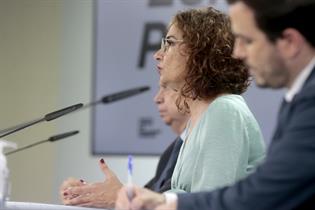 Foto: Pool Moncloa/JM CuadradoAs regards the spread of the COVID-19 pandemic, María Jesús Montero stated that Spain continues to register an increase in the number of transmissions, but that it is still too early to evaluate the impact of the measures that the regional governments have adopted in recent days, following the approval of the state of emergency.
Foto: Pool Moncloa/JM CuadradoAs regards the spread of the COVID-19 pandemic, María Jesús Montero stated that Spain continues to register an increase in the number of transmissions, but that it is still too early to evaluate the impact of the measures that the regional governments have adopted in recent days, following the approval of the state of emergency.
The Government Spokesperson stated that the Inter-territorial Health Council will meet on Wednesday to gather all the information available on the evolution of the disease and adopt measures together with the regional governments and make recommendations for the whole country. "We need resounding measures that prevent the spread of the virus through criteria of prudence, rigour and scientific evidence to tackle this situation", she said.
The minister also announced that the President of the Government, Pedro Sánchez, will begin a round of visits to the different regions this week, starting with the Region of Valencia, to present and further develop the European Union Recovery and Resilience Plan.
Non official translation





